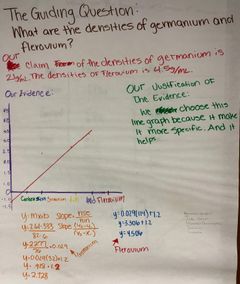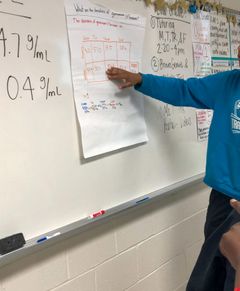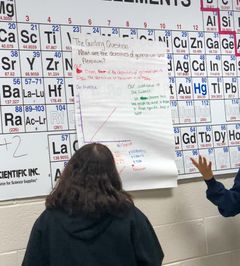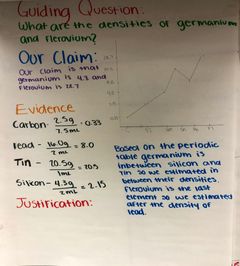Our featured teacher for November is Lauren Nichols, chosen for going the extra mile and securing a grant to attend an Introduction to Argument-Driven Inquiry. Lauren is a high school chemistry teacher Meadowcreek High School, Gwinnett Public Schools, Norcross, Georgia and is in her fifth year of teaching.
Q: How and when did you learn about ADI?
Lauren: I learned about ADI 4 years ago in my first year of teaching. I can’t remember if I was just Googling inquiry labs and stumbled across it or if I heard about it in one of my graduate courses. After that, I went to a Georgia Science Teachers Association conference and heard someone was presenting on inquiry labs and they mentioned how they used ADI. So, I bought the book and tried some. I tried some from the book and also converted an old “cookbook” lab into the ADI style. I was trying to make my labs more inquiry-based anyway, and I liked the ADI format of including the background information and the clues. I converted the percent of isotopes cookbook lab I had and used the proposal sheet.
Q: What made you decide to seek training in ADI?
Lauren: When I was doing ADI in class, I knew it could work and I knew it could go well, but I just felt that I needed help. I hadn’t had a facilitator take me through each stage, so I had trouble taking my students through it. My lack of confidence led to some troubles, especially for the investigation proposal part. I teach co-taught, which is general education and special education students in the same class and a lot of them are have English as Second Language. I struggled with the gallery walk part and how to let them be wrong, I was very unsure about it all.
Q: What grant did you receive that helped fund your ADI training?
Lauren: I received the American Chemical Society-Hach Professional Development Grant. The grant is specifically for HS chemistry teachers to attend professional development. The grant paid for my travel expenses to the training in Indiana, the registration for the workshop, and I got three of the ADI books.
Note: The ACS-Hach Professional Development Grant accepts applications between October 15 and January 4 annually. More information is available at ACS.org
Q: What do you like most about ADI?
Lauren: The thing I like the most is how student-centered it is and how excited the kids get when they realize what they are supposed to be doing. It is a bit of struggle for my students at first, but they really learn through the struggle. They become more critical thinkers about what they are doing and why, the data they are collecting, and the equipment they are using. The why part is something they don’t learn very often in traditional labs. I also like the scaffolding supports, and you guys provide great scaffolds. The sentence starters for writing the lab reports really help my students. I get more writing from my students when I use the sentence starters so that is very exciting.
Q: How many ADI do you do in a year?
Lauren: I do 4-5. My schedule is interesting because chemistry is paired with a companion class because they take chemistry with scientific engineering research. All the students who take chemistry also take the paired class which allows us to extend their learning. The companion class is almost all lab-based. The ADI labs really fit in with that, because they hit the Science and Engineering Practices from the NGSS. All of those SEPs are in the ADI labs. We are on an A/B block, so my chemistry kids see me every day with chemistry and the companion class, so they see me every day for 90 minutes. We believe our Special Education and English Learner kids are just as capable of learning the material, they just need more time, so we built that into the schedule. If there are students who don’t have the companion class because of a schedule conflict, they don’t score as well on district assessments, so the companion class really works. The class allows me to spend more time on a topic if my kids are really struggling. We can do extra activities to allow them more time to figure it out.
Q: What is your favorite ADI investigation?
Lauren: Density and the Periodic Table from the ADI Chemistry book, lab number 13. The students are using the densities of carbon, lead, silicon, and tin to predict the densities of germanium and flerovium. It helps them get the idea of trends and how to use graphs to make predictions, but it also reinforces density which was previously taught. It really hits on the periodic trends and the patterns which I really like.
Q: What did you find challenging when using ADI at first and how were you able to overcome that challenge?
Lauren: With the ADI labs I really struggled with the pacing and allowing students to be wrong. It was painful to me because I thought I needed to correct them right away or they would get a misconception. But when we do the gallery walk, I see their brains light up when they realize what they missed, I have students almost yelling at me that they want to go back and collect more data. The students are engaged in choosing how to do the investigation, they own it.
When they are writing the proposal or doing the experiment, they want me to tell them what to do. I tell them they are the chemists and they have to decide, over time it has gotten a lot easier, especially after the training. Now I know what to expect and how they are going to fix their own mistakes later. Now that I have done more ADIs, and as the kids do more each year, we are on our second for this year, it gets easier. Doing the poster the for second investigation was a lot easier. It went a lot faster and the feedback they gave each other was smoother. I can only imagine if my students did in biology and came to me knowing the format, it would be even better.
I think the structure, design, and the effort that has gone into the background information and teacher notes are really helpful. I was able to put this into my classroom before the training, I started to implement this my second year of teaching. The training this year has helped with my confidence which has helped me be able to explain each part to my students. But, if you are an experienced teacher, I can see this being a lot easier, even without training, just try and see what happens.




